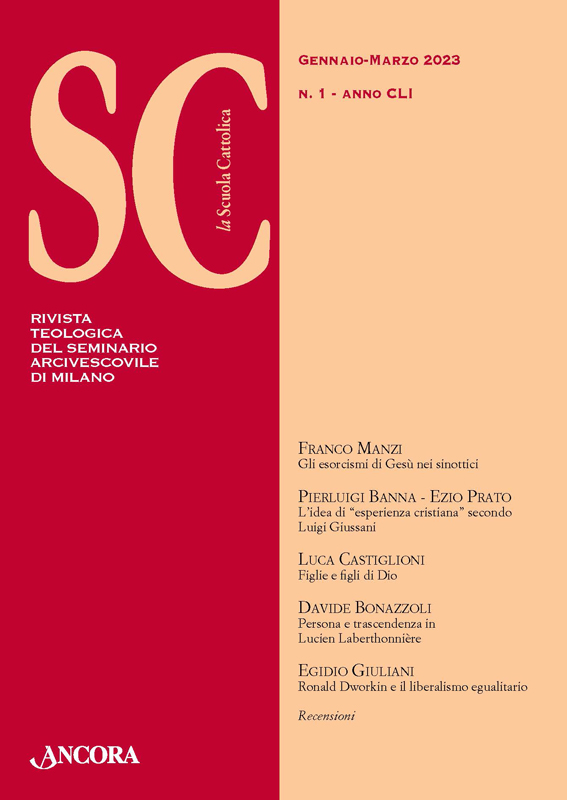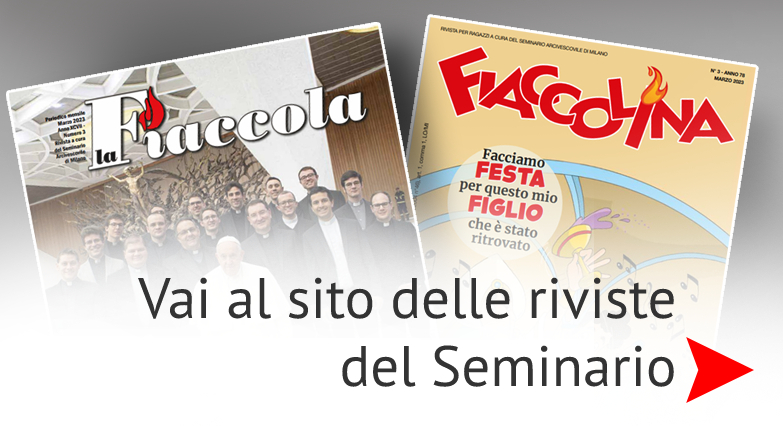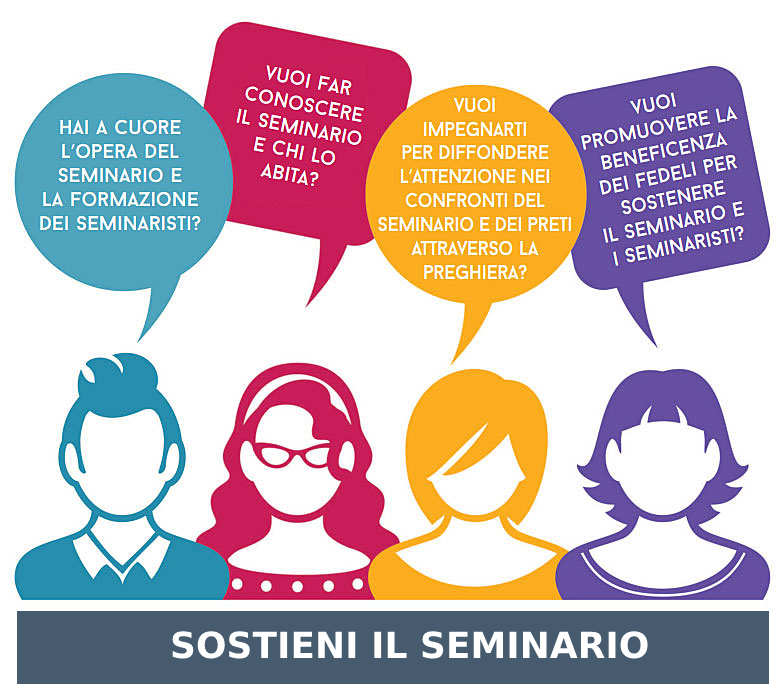Espressione della scuola teologica del Seminario Arcivescovile di Milano, “La Scuola Cattolica” è una delle più antiche riviste teologiche

Sommari:
FRANCO MANZI, «Scacciò gli spiriti e guarì tutti i malati». Discernimento sugli esorcismi di Gesù nei sinottici (I), 7-28
Nell’attuale ricerca sul Gesù storico si è creato un notevole consenso, fondato sull’utilizzo di vari criteri storiografici, nel ritenere storicamente sicuro il fatto che egli abbia operato spesso non solo guarigioni ma anche esorcismi. Dopo avere valutato in modo necessariamente conciso la fondatezza storica di tre dei sette racconti sinottici di esorcismo, la presente ricerca verifica gli indizi testuali che portano a ritenere che si trattasse di esorcismi veri e propri.
In the current research on the historical Jesus, a considerable consensus has emerged, based on the use of various historiographical criteria, to the effect that it is historically certain that he often performed not only healings but also exorcisms. After assessing in a necessarily concise manner the historical soundness of three of the seven Synoptic accounts of exorcisms, the present research verifies the textual clues that lead to believe that these were indeed really and truly exorcisms.
PIERLUIGI BANNA – EZIO PRATO, L’idea di “esperienza cristiana” secondo Luigi Giussani, 29-57
L’idea di esperienza cristiana è stata per Luigi Giussani (1922-2005) un punto di costante riferimento nell’elaborazione della sua riflessione teologica, riflessione inscindibilmente legata all’impegno educativo. Per Giussani, sono tre i fattori costitutivi di tale esperienza: il fatto di un incontro; la percezione del significato di questo incontro da parte del soggetto; la verifica, ovvero la coscienza della corrispondenza tra il significato e le esigenze fondamentali dell’esistenza. Attorno a questi tre fattori, è possibile raccogliere diverse tra le riflessioni giussaniane sui temi cristiani maggiori: il creato e l’uomo, Cristo e la Chiesa (primo fattore); la ragione e l’affezione, la moralità e la libertà, la fede (secondo fattore); il centuplo, il lavoro, la verginità, la creatura nuova (terzo fattore).
The idea of Christian experience was for Luigi Giussani (1922-2005) a constant reference point in the elaboration of his theological reflection, a reflection inseparably connected to commitment to education. For Giussani, three are the factors which constitute such an experience: the fact of an encounter; the perception of the meaning of this encounter by the subject; the verification, or rather the awareness of the correspondence between the meaning and the fundamental needs of existence. Surrounding there three factors, it is possible to collect a variety of reflections of Giussani on the principle Christian themes: creation and the human person, Christ and the Church (first factor); reason and affection, morality and freedom, faith (second factor); the hundredfold, work, virginity, the new creation (third factor).
LUCA CASTIGLIONI, Figlie e figli di Dio. Compendio di uno studio sulle relazioni fra donne e uomini alla luce dell’uguaglianza battesimale, 59-89
Il contributo compendia i risultati di una ricerca dottorale sulle relazioni fra donne e uomini. Essa, partendo dall’ascolto della voce delle donne levatasi nella modernità e dallo studio critico del modo in cui la Chiesa (cattolica) vi ha reagito, avanza un’ipotesi per superare le difficoltà emerse (e tutt’ora presenti) fondandola sulla realtà battesimale. Per questa via si giunge ad articolare la radicale uguaglianza di donne e uomini – derivante dall’unità mistica dei credenti in Cristo – con le loro differenze (anche quella sessuale) intese in senso non discriminatorio ma carismatico, e a sormontare la violenza che ancora connota il loro rapporto. Tale prospettiva escatologica, esplorata nelle Scritture (Paolo, Genesi, Cantico, Vangeli), permette di illuminare alcuni dei dibatti antropologici, ecclesiologici e teologici suscitati dal femminismo.
This contribution summarises the results of a doctoral research on the relation between women and men. The paper, which begins by listening to the voice of the women who stood out in modern times and from the critical study of the way in which the Catholic Church reacted, puts forth a hypothesis in order to overcome the difficulties which have emerged (and still persist today) founded on the reality of baptism. In this way one arrives at the articulation of the radical equality between men and women – derived from the mystical union of believers in Christ – with their differences (also sexual) understood in a non-discriminatory but charismatic sense, overcoming the violence which still describes their relationship. Such an eschatological perspective, sought in the Scriptures (Paul, Genesis, Song of Songs, the Gospels), permits us to shed light on some anthropological, ecclesiological and theological debates brought up by feminism.
DAVIDE BONAZZOLI, La metafisica della carità. Persona e trascendenza in Lucien Laberthonnière, 91-118
Attraverso l’analisi delle principali opere di Lucien Laberthonnière, nonché delle meno note Conférences de carême, si intende riaccendere la riflessione attorno alla modalità di accesso dello spirito creato alla verità, che non si fermi unicamente al momento intellettivo. Siamo ancora al di qua infatti di un superamento completo dell’antropologia delle facoltà. In un pensiero, seppure acerbo, come quello di Laberthonnière, crediamo ci sia la possibilità per formulare un discorso teologico che sappia veramente farsi carico dell’universale valenza salvifica della Rivelazione di Dio – che si dà in quell’evento singolare che è Gesù Cristo – a cui si accede nella concretezza del vissuto singolare.
By means of the analysis of the principle works of L. Laberthonnière, as well as the less well known Conférences de carême, our intention here is to rekindle the reflection on the way in which the created spirit accedes to the truth, access not limited only to a movement of the intellect. In fact we find ourselves still far from completely overcoming an anthropology of the faculties. In the although not fully formed thinking of Laberthonnière, we believe there is the possibility of formulating a theological discourse which can truly take on board the universal significance of the Revelation of God – which gives itself in that singular event of Jesus Christ – to which each single person has access in the concreteness of daily living.
EGIDIO GIULIANI, Diritti, giustizia e vita buona. Ronald Dworkin e il liberalismo egualitario. Una lettura morale, 119-144
Ormai nel dibattito pubblico – da destra a sinistra – pochi resistono alla tentazione di definirsi “liberali”, salvo poi ulteriormente precisare la propria posizione. Può quindi interessare alla teologia morale il confronto con uno degli esponenti più significativi della filosofia del diritto statunitense – Ronald Dworkin – che si inserisce a pieno titolo nella corrente egualitaria del pensiero liberale anglosassone contemporaneo. Il suo percorso lo ha portato dall’iniziale adesione al liberalismo classico ad un’elaborazione maggiormente avanzata in merito ai diritti dell’individuo, nella quale ha una posizione centrale la virtù dell’uguaglianza. Può essere utile dunque istituire un confronto con altre filosofie contemporanee della società (Habermas) e con il magistero della Chiesa in merito al concetto (contiguo ma distinto) di “bene comune”.
In public opinion – along the whole Left-Right political spectrum – few can resist the temptation of calling themselves “liberal”, without further specifying their own position. It may therefore be of interest to Moral Theology to dialogue with one of the most significant exponents of the Philosophy of American Law – Ronald Dworkin – who rightly finds his place in the egalitarian movement of contemporary English speaking liberal thought. From his initial adhesion to classical liberalism, his course of studies brought him to a much more advanced theory regarding individual rights, in which the virtue of equality occupies a central role. It may therefore be useful to introduce a comparison with other contemporary Philosophies of society (Habermas) and with the teaching of the Church regarding the contiguous but distinct concept of “common good”.

